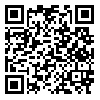BibTeX | RIS | EndNote | Medlars | ProCite | Reference Manager | RefWorks
Send citation to:
URL: http://jhr.ssu.ac.ir/article-1-371-en.html

 , Mohammad Reza Baneshi2
, Mohammad Reza Baneshi2 
 , Razieh Khajeh Kazemi3
, Razieh Khajeh Kazemi3 
 , Minoo Mashayekhi4
, Minoo Mashayekhi4 
 , Yaser Gharaei Khezripour5
, Yaser Gharaei Khezripour5 
 , Farzaneh Zolala *6
, Farzaneh Zolala *6 

2- Research Center for Modeling in Health, Kerman University of Medical Sciences, Kerman, Iran
3- HIV/STI Surveillance Research Center, and WHO Collaborating Center for HIV Surveillance, Institute for Futures Studies in Health, Kerman University of Medical Sciences, Kerman, Iran
4- Department of Prevention and Control of Infectious Diseases, Deputy of Health, Kerman University of Medical Sciences, Kerman, Iran
5- public Health,Kerman University of Medical Sciences, Kerman, Iran
6- Research Center for Modeling in Health, Kerman University of Medical Sciences, Kerman, Iran ,
ABSTRACT
Introduction: Animal bites are one of the serious threats to human health, leading numerous consequences such as fatal disease of rabies. Given the importance of animal bite throughout the country, the purpose of the present study was to investigate the geographical distribution, time trend and epidemiological characteristics of animal-bite cases in Bardsir County, Iran.
Methods: This cross-sectional study was conducted on the records of people suffering from animal bite between April 2010 and March 2014 in Bardsir County. Data were analyzed in SPSS v.20 software using descriptive statistics including frequency and percentage, log-linear model and time series model. Arc GIS software was employed to plot the geographical distribution of animal-bite cases.
Results: The findings of this study indicated that totally 1,500 cases of animal bite had occurred during the study period. Mashiz district (with 695 cases of bite) had the most animal bites. In terms of time, animal-bite cases had no particular trend. The results showed that the incidence rate of bite in men was 2.12 times more than in women (p<0.001). In the age group of 31- 45 years compared to the reference age group (0-6 years), the rate of bite was 5.98 times greater (p<0.001). In the homemakers compared to the reference group (children) the incidence rate of animal bite was 4.96 times greater (p<0.001). Among the biting animals, dogs were responsible for the most bites (76.9%). In terms of bitten organs, limbs were bitten frequently (52.8%). The majority of victims had received the vaccine in accordance with the three-dose immunization schedule (91%).
Conclusion: It seems that the determinants regarding high incidence of animal bite in Bardsir County are the type of activities and occupations. Therefore, special and preventive educational programs might be useful in high-risk groups.
Keywords: Animal Bite,Time Trend, Bardsir, Iran
Received: 2017/06/19 | Accepted: 2017/12/5 | Published: 2017/12/5
| Rights and permissions | |
 |
This work is licensed under a Creative Commons Attribution 4.0 International License. |



